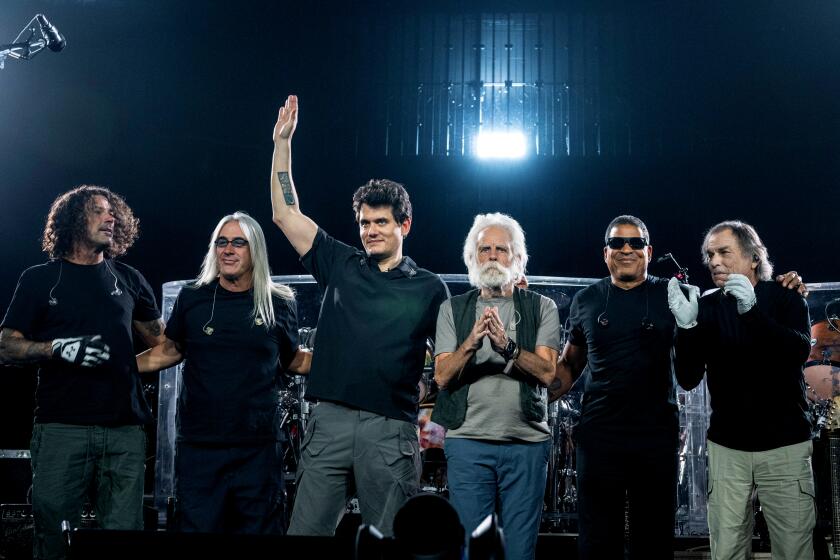Educators Conference: A Celebration of the Art Form
The 22nd International Assn. of Jazz Educators conference, which concluded its four-day run at the Anaheim Hilton and Towers last Sunday, was a boon for those jazz fans in attendance.
There were performances by notables--Roy Hargrove, Nancy Wilson, Louie Bellson--and the soon-to-be-noted: tenorman Joseph Berryman and drummer Clyde Adams with the outstanding combo from the High School for the Performing and Visuals Arts in Houston. In clinics by performers such as drummer Dave Weckl, bassist Dr. Art Davis and pianist Michael Wolff, topics ranged from the necessity of finding your own style and approach in improvisation to using the drum kit as a support system for a band, not an excuse to create a maelstrom.
Throughout the conference, first-rate student performances--from 60 college and high school ensembles, 35 from California--abounded. On the Hilton’s lobby stage, big bands from Western Michigan University, Cal State University Long Beach and DePaul University played high-caliber programs that grabbed listeners. At another venue, the Gold Company vocal ensemble from Western Michigan offered an a cappella version of “It Don’t Mean a Thing” that was amazingly complex, yet swung with surety.
The professionals delighted crowds, both in evening concerts headlined by Wilson, Bellson, Hargrove et al, attended by as many as 3,000 conference participants, and in performances in smaller venues during the day. Highlights among the latter included trio sessions by Wolff and bassist David Friesen, whose band sported superb drummer Randy Jones. Yellowjackets’ saxman Bob Mintzer guested with the De Paul band and swung like mad. Mel Martin’s BeBop and Beyond, bolstered by fine performances from the reedman-leader and drummer Tootie Heath, captivated the audience. And there were countless other peak moments.
But the event, except for the evening concerts, was open only to members of the association, 5,000 of whom from 35 nations attended the convention. One then might question the impact of this affair on the jazz fans who couldn’t attend and the general public at large.
Chuck Iwanusa, the president of the association, had a ready answer: a heightened awareness of jazz.
“On a simple level,” Iwanusa said, “maybe a hotel employee who knows nothing about jazz might have worked during one of the concerts, been excited by the music and, on his night off, gone to a club.” But, on a deeper plane, said William Lee III, a past association president and producer of this year’s conference, an event like this is about consciousness-raising.
“Jazz is perhaps America’s only original art form,” he said. “It’s an intellectual music, like classical music, and it makes you think. Understanding it enhances the quality of one’s life.”
“It takes a creative mind to play jazz,” or enjoy it, said Iwanusa, who teaches music at Mott Junior College in Flint, Mich. “That leads to less rigid thinking in general and looking for creative ways to solve problems, no matter what you do in life.”
Iwanusa also stressed that jazz matters because it gives a sense of identity to our culture. “During the Ken Burns’ PBS show on baseball,” said Iwanusa, “an anthropologist said, ‘In 2,000 years, people will look back on our society and remember us for three things: the Constitution, baseball and jazz.’ Now a high school graduate should know something about the Constitution, will almost certainly know something about baseball, but how many will know something about jazz?”
Both Iwanusa and Lee believe that any hopes for the future of jazz lies in education. “If we don’t teach young people . . . jazz will die out as an art form,” Lee said.
But if the level of enthusiasm at the conference was any indication, that demise is all but an impossibility.
“What I love about this event is that everybody is into the music,” Wolff said. “Other conventions, people are selling this or that, but here it’s the music.”
Adams, the 18-year-old Houston drummer, believed that the atmosphere of the conference had “pushed him toward becoming his own person.” Adams also said that he thought that jazz could be taught technically, “but, after that, it’s what you have in your heart and soul” that determines how you play. He also said that it didn’t matter what your ethnic background was when it came to playing the music. “Blacks laid the foundation, but now it’s up to us musicians to follow, and we’re all in it pretty much the same,” he said.
More to Read
The biggest entertainment stories
Get our big stories about Hollywood, film, television, music, arts, culture and more right in your inbox as soon as they publish.
You may occasionally receive promotional content from the Los Angeles Times.








